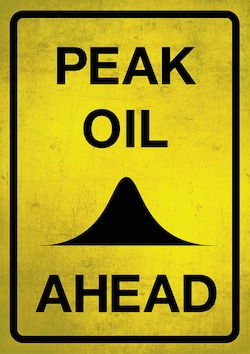There are enough articles on the “myth of peak oil” floating around the Internet to fill a book; and there are enough books on the subject to fill a small library. One of the common threads throughout these publications is their lack of credible sources, because not only is peak oil real, but we’re rapidly approaching that threshold.
An example that is smacking the United States and the oil industry in the face right now is floating in the Gulf of Mexico.
According to a new government report, oil and natural gas production in the Gulf has been steadily declining for the last decade. The report looked at oil production in the Gulf of Mexico on federal lands only, not any privately-held lands where production is taking place. Since 2010, according to the report, the annual yield of oil from the Gulf has fallen by almost 140 million barrels.
While the Gulf region still accounts for 69% of U.S. oil produced on federal lands, the dramatic decline in production tells a story that the oil industry doesn’t want us to hear. Peak oil is clearly beginning to play a role in U.S. exploration.
Contrary to what some of the peak oil deniers want the public to believe, peak oil does not mean that we’re about to run out of oil. What it means is that the United States is running out of easily accessible, financially viable oil. As that easy to retrieve oil disappears, companies have to drill deeper and deeper or in otherwise inaccessible places in order to get their oil.
This makes the process much more expensive and drives costs up to the point that profits are hard to come by. And this is what we’re beginning to see in the Gulf of Mexico.
It isn’t because oil drilling is decreasing in the Gulf, either. In fact, oil drilling in the area has been accelerating in recent years, so the decline in production is not the result of fewer wells being drilled.
On top of the increased drilling, earlier this year President Obama announced that his administration would be opening up an additional 40 million acres of the Gulf for oil leasing, which was a follow-up to the announced 72 million acres that had been opened up for leasing just a few months prior.
This makes slightly more sense with the new information about the declining oil production — the president was giving the dirty energy industry a favor by trying to help them access more readily available oil.
The recently opened lands will likely not help the problem of declining production, because they aren’t solving the ultimate problem of fossil fuel addiction. The industry and their echo chamber have told us that the immediate solution is the natural gas fracking boom will surely take the edge off our oil addiction.
But peak production is even more of a problem with natural gas than it is for oil. As it turns out, production from fracking wells decreased by between 60 and 80% in just the first year of activity, which is why wells constantly have to be drilled in new areas.
While reports show that the “fracking boom” will be very short lived, the deniers continue to tell us that it is here to stay, and will also be the solution to weaning ourselves off foreign oil.
Even the industry itself is coming to terms with peak oil. BP, the company responsible for helping to destroy the Gulf of Mexico’s ecosystem with their 2010 oil geyser, recently admitted that there is probably about 53 years worth of oil left on the planet to supply growing demands.
That’s a pretty harsh warning from a company that makes billions off of consumer demand for oil.
Declining production and dire warnings from the industry all underscore the main problem: Human beings are addicted to oil and that addiction is simply not sustainable.
But, in true human fashion, we’ll continue to pump every last drop out of the earth before we attempt to move on. After all, that’s the nature of addiction.
Subscribe to our newsletter
Stay up to date with DeSmog news and alerts







